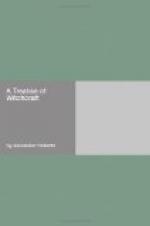Third Proposition
Footnote m:
hippomenes faetae semina legit
equae.
A more recent
text (the 1898 Teubner) has “hippomanes fetae
semina legit equae."
Footnote u:
Nubilaque iudico...
Modern texts
such as the 1907 Teubner give VII. 202 as
“Nubilaque
indico...” The word “iudico”
does not fit the metre,
and may be typographic
error.
+ouranothen katagontes...+
The wording
was reconstructed with the aid of the Loeb text,
which had no significant
incompatible points
Fourth Proposition
Footnote f:
...enormiter instigante si
eius ob*quijs & arti magica obligauit...
Reading unclear:
may be abbreviation for ‘obsequiis’ or
‘obloquiis’.
The text could not be identified.
Fifth Proposition
Footnote i:
Hesiodus +ergon kai hemeron+
lib. 1. D[e,]monas ait esse
+aera essamenous+.
The text cited,
Hesiod’s Works and Days_, is not divided
into
books. The
words occur in l. 125, bracketed in the Loeb edition._
Footnote s:
Sophocles in Trachinijs vocat
+drun poluglosson+, quia ut eius
Scholiastes interpretatur...
The words occur
in l. 1168. The scholia were unavailable to me.
Eighth Proposition
Footnote t:
Stromateon libr. 1. gestauit
+duo daktolious gegoeteumenous ouk
apothano de homos dolophonetheis
kai toi prosemenantos tou psophou.+
Reading unclear.
The text (Clement of Alexandria, Stromata_
bk. 1) was unavailable
to me._
Footnote u:
Odissea 19. vulnus Vlyssis
+Autolukou philoi paides desan
epistamenos epaoide de haima
kelainon echethon.+
The passage
occurs at 19.455-458. The words are differently
arranged but are
essentially the same.
Footnote gg:
+arxamenos legein ho kikeron
huperphuos ekoinei+
Plutarchus in Cicerone
A more recent
text (the 191 Loeb) has +huperphuos ekinei+.
The last word
is largely illegible; +ekoinei+ is the best
guess. ]



